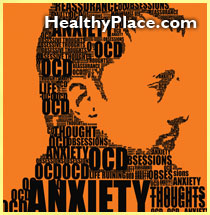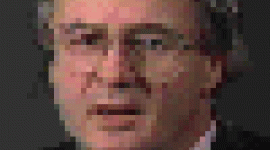What To Do About the Obsessions Part of OCD


Dr. Michael Jenike talks about one of the most difficult aspects of Obsessive Compulsive Disorder (OCD), obsessions, including obsessive thoughts, intrusive thoughts, disgusting thoughts and what to do about them. We also discussed medication for treating OCD, Cognitive Behavioral Therapy, and treatment-resistant OCD.
David Roberts is the HealthyPlace.com moderator.
The people in blue are audience members.
David: Good Evening. I'm David Roberts. I'm the moderator for tonight's conference. I want to welcome everyone to HealthyPlace.com.
Our topic tonight is "What To Do About The Obsessions Part Of OCD." Our guest is Dr. Michael Jenike.
Understanding that everyone in the audience might have a different level of knowledge, here's some basic information about Obsessive-Compulsive Disorder. There's even an OCD screening test on our site.
Just so everyone knows, obsessions are unwanted, recurrent, and disturbing thoughts that the person cannot express and that cause overwhelming anxiety. (i.e. fear of germs or toxic substances, did I unplug the coffee pot?, etc.)
Our guest tonight is Michael Jenike, M.D. Dr. Jenike is a psychiatrist at Massachusetts General Hospital, a Harvard Medical School professor and his primary research interest is in obsessive-compulsive disorders. He has written numerous articles for scholarly journals on the topic, authored a book entitled "Obsessive-Compulsive Disorders: Practical Management," and he is a member of the board of directors of the Obsessive Compulsive Foundation.
Good evening, Dr. Jenike, and welcome to HealthyPlace.com. We appreciate you being our guest tonight. What is it that causes certain individuals to have obsessive thoughts?
Dr. Jenike: Thanks. Everyone has intrusive thoughts, but people with OCD give them special significance and they get stuck in their minds. We really do not know what causes Obsessive-Compulsive Disorder in most patients, occasionally, it can occur after strep infections or head injury, but this type of cause is very unusual.
David: How do the obsessions get started?
Dr. Jenike: Patients often report that they have a sudden onset of some thought that upsets them, for example, that they did something hurtful to someone else, said something inappropriate, or some sexual thought that is repulsive to them, like wanting to molest their children or parents. We don't know why some people get these types of thoughts stuck in their heads. For those without OCD, we're able to chalk those off to "passing thoughts". What is that makes a person with OCD obsess about them? I wish I knew, but I don't. If I get a thought that seems bizarre, I just let it pass. If I had Obsessive Compulsive Disorder, I would try to find some significance in the thought and somehow determine that I was a bad person, etc.
Interestingly, the more one tries to get rid of such a thought, the more it intrudes. The classical example is telling someone without OCD not to think of a white bear for the next 5 minutes. In careful studies, this has been shown to cause the thought to come much more often, so telling OCD patients to force the thoughts out of their heads, just makes things worse.
David: So what is the answer to ridding yourself of these obsessions?
Dr. Jenike: Good question. We know what not to do.
The first thing to do is to educate the person. once they know that we all (except me, of course) have such thoughts and that they are normal, that often helps a lot just by itself.
Next, tell them not to try to force the thoughts out of their heads, but just let them pass naturally. Don't try to read any significance into the thoughts. If you are obsessing about wanting to have sex with your baby, don't interpret this as you being a bad mother, the thoughts, have nothing to do with the character or motivation of the person. They are produced naturally by the brain, and if you have OCD, your normal filtering mechanism does not work so they get stuck.
There are medications that may lessen considerably the thoughts, and even lighten your interpretation of them. In some patients, we use what are called "loop tapes." These are tapes on which a person records, in their own voice, the disgusting thoughts and plays them back for a couple of hours per day, until they essentially become boring. This lessens, greatly, the hold that the thoughts have on the person.
One final thing, Dr. Lee Baer has a great new book coming out called: The Imp of The Mind, due out in January 2001. I don't get any royalties, but after tonight maybe I can make a deal with him!
David: I want to touch on one thing you said before we get to some audience questions. Earlier, you mentioned that we should let the obsessive thoughts pass naturally. Of course, people with OCD have great trouble with that. Is that something that can be taught in therapy?
Dr. Jenike: The main thing that can be taught, is that these thoughts come into everyone's minds and are normal. This helps a lot.
So, the problem is not that OCD patients have abnormal thoughts (we all do); it is their interpretation of the thoughts and their holding onto them, as if they have some intrinsic value.
David: Here are some audience questions.
GreenYellow4Ever: Sometimes obsessive thoughts literally keep me awake for hours. Do you have any suggestions for how to deal with the "thought train" so that I can get some sleep?
Dr. Jenike: See how helpful a psychiatrist can be!
I would start with a careful evaluation; both medically and psychiatrically. The doctor needs to know the complete situation. For example, do you have any other problems? Depression would be a common reason for sleep problems.
Also, one needs to evaluate what medications you are taking, some can interfere with sleep. Often, just changing the time you take the medications may help.
If you are laying there at night with little stimulation, that is a fertile time for the mind to get going with obsessive thoughts. I don't think I can give specific treatment recommendations for someone I don't know, but these are general approaches.
kmarie: Hi, Dr. Jenike. What's the best medication for treating OCD?
Dr. Jenike: Here's a good discussion of current medication treatments for OCD." The main OCD medications that are used have been evaluated in so-called placebo-controlled trials. The ones shown to be partially effective are, Anafranil (Clomipramine), Luvox (Fluvoxamine), Paxil (Paroxetine), Prozac (Fluoxetine), Celexa (Citalopram). There is some evidence that Effexor is also helpful, but there are still no good studies. The medications generally need to be used at high dosages for three months, to evaluate if they will help or not. It is important for the patient to know this, since many psychiatrists give up on the medication after a month or so, and they also may be using low dosages. They are used to treating depression more than OCD, and depression often responds faster and with lower dosages.
David: KMarie, there's also a lot of information on OCD and medications here. For information on specific medications, including side-effects, you can to go to the HealthyPlace.com medications area.
Dave*: Are obsessions the same as ruminations?
Dr. Jenike: If you use standard definitions, ruminations and obsessions are technically different.
Obsessions refer to the thoughts in OCD, and ruminations refer to things that get stuck in one's head when one is depressed. Ruminations generally make sense to the depressed person; while obsessions are usually experienced as nonsensical to many OCD patients.
For example, a depressed patient may ruminate about how he cheated on his taxes twenty-five years ago and what a bad person he is, while a patient with OCD will have thoughts like, " I want to have sex with the Virgin Mary; or I want to kill my mother;" etc.
Linlod: I have been struggling with molesting obsessions for awhile. I am on medications and they help. I am also doing Cognitive Behavioral Therapy (CBT). When will I habituate?
Dr. Jenike: First, we should explain habituation. It is a description of what we hope happens when you keep doing what makes you anxious, which is at first get more and more anxious, and after time, get used to whatever you fear. This is called habituation. Almost all people with OCD will habituate to the anxiety eventually, and medications help a lot.
Cognitive Behavioral Therapy, CBT is actually (in my opinion) the best treatment for OCD. Medications are often used with CBT.
cwebster: What is the difference between Obsessive Compulsive Disorder thoughts (e.g. wanting to kill Virgin Mary) and psychotic delusions? Both seem upsetting to the thinker.
Dr. Jenike: The difference between a psychotic thought and an obsession is that the psychotic person believes the thought, while the person with OCD knows that it is nuts, but has very strong feelings about it. And this brings up an interesting point. (Having said that, I better come up with something good!).
With OCD, the person intellectually knows that his or her fear or obsession is not warranted, but the person still has a feeling inside that it is true. If you don't have OCD, the thoughts and internal feelings match, but if you have OCD, the feelings are very disturbing and paralyzing. Even though, the cognitive part of your brain knows that, some people can be on the edge and occasionally believe that their obsessions are real, but most know the difference.
David: A few site notes: Here's the link to the HealthyPlace.com OCD Community. You can click on this link and sign up for the mail list at the top of the page so you can keep up with events like this.
For those in the audience, if you've found a way of coping with your obsessions, go ahead and send me your solution and I'll post it as we go along.
Now onto more audience questions:
mitcl: Have you ever heard of Eye Movement Desensitization and Reprocessing (EMDR) for helping treat OCD.
Dr. Jenike: EMDR has been reported to be of some help with Post-Traumatic Stress Disorder (PTSD), but not with OCD.
MYTWOGRLSMOM: My mind goes constantly. I count everything and I am constantly saying prayers, so nothing "bad" will happen. How can I help myself to stop this?
Dr. Jenike: This is one of the typical OCD symptoms. You need to work with a good cognitive behavior therapist to develop a treatment plan. Also, medications may help.
When you say that your mind goes constantly; it is probably generating obsessions. Then, the counting and praying are actually mental rituals that you do to lessen the anxiety caused by the obsessions. You need to have a plan to stop the rituals, and just feel the anxiety produced by the obsessions. Once your brain learns (and I mean learns) that you will not do rituals, it will tire of generating obsessions. As I said, medications can help this process. Some of your mental rituals, are by now almost automatic, so you will have to make a conscious effort to cut them back. The first step is to list all the mental rituals, and then decide which ones to approach first.
Besides the book I mentioned earlier, another good book is "Getting Control". This book gives all kinds of self help advice.
David: I am getting some questions regarding what constitutes a diagnosis of OCD. You can click the link for that.
Here are some audience comments on what's worked for controlling obsessions:
matrix*: Obsessive-Compulsive Disorder, to me, is like an itch on my arm. I must scratch it and it feels better once scratched, but actually it spreads and gets worse in the long run. If I don't scratch the itch, it gets real bad, but in awhile, it fades away.
cwebster: To reduce obsessions, I take medications (Effexor-XR, Serzone) and tell myself to just let the thoughts go, they're not important. If that doesn't work, I take Seroquel and pass out!
Kerri20: I wanted to share that exposure and response therapy, as well as CBT, helps me a lot.
Dr. Jenike: Exposure and response prevention is the BT part of CBT.
Gridrunner: Have you heard of some success using St. John's Wort or 5-htp to lessen OCD?
Dr. Jenike: Yes, there are a few cases where St. John's Wort has helped OCD. In Germany, there are dozens of studies using SJW for mild to moderate depression, but its use for treating OCD is relatively new. I have tried it in quite a few patients, with not much success. But then again, most of the patients I see now, are on the more severe end of the spectrum.
Bea: What kind of dosage of the St. John's Wort is effective for OCD?
Dr. Jenike: It depends on the preparation. It is approximately three tablets per day of the most commonly available preparations. There is quite a bit of information on the internet about dosing. The dosing studies are with depression, but most people use similar doses for OCD.
HealedHeart: I have a severe fear of germs. I don't exactly know what the fear is, as I'm not really afraid of getting sick. However, I can't touch library books or anything like that, without having to wash my hands over and over. Also, I can never wear anything more than once without washing it.
I am entering the working world and will have to take the public bus. I don't know how I will survive sitting and touching seats that so many other people have touched. What can I do about this?
Dr. Jenike: You are CBT deficient in a big way. For advice, go to the OC Foundation web site, join the OCF and learn about OCD and how to treat it. Medication for treating OCD may help.
The people with fear of germs are actually the easiest to treat, and success rates are great if you do the exposures and response prevention. If you contact a support group locally, they can tell you which local doctors know how to treat OCD.
David: CBT, by the way, is Cognitive Behavioral Therapy. You can read more about how to use CBT to treat OCD here.
Brin: I have been taking Klonopin (Clonazepam) for five years. I decided to wean myself off. I have been tapering for about two weeks and now I am completely off, and I am having horrible withdrawal symptoms. Can you give me any idea of how long these withdrawals can possibly last?
Dr. Jenike: If you are on high dosages of a benzodiazepine like Klonopin, sudden stopping can be dangerous. If the dose is low, there is probably no problem. Withdrawal depends on dosing and length of time you have been on the drug. Since I don't know dosage, I cannot comment intelligently. Even if I did know the dose, I can't comment without being familiar with your case.
Also, I don't know what withdrawal symptoms you are having. I would think that by two to three weeks, you should be back at baseline. Keep in mind that the Klonopin may have been helping anxiety and maybe the anxiety is returning so the problems are not actually withdrawal. Also, Klonopin is not a great anti-OCD drug.
sbg1124: Is it possible for some SSRI's to make OCD worse?
Dr. Jenike: Yes. I think that, sometimes, worsening OCD symptoms (not side effects) actually predicts a good response. That is if the patient can stay on the drug long enough. It is a rare OCD patient who continues to have worsening OCD on these drugs, but I have seen it. Sometimes, the drugs help, but other times, they can make things worse.
David: Here's an audience suggestion on how to effectively deal with obsessions:
matrix*: I tell someone I can trust to check something (the stove, bathtub water) so they can tell me it's really off, so I don't have to check it over and over. It helps a little.
Dr. Jenike: This is a bad idea! You are actually having someone else do checking for you.
David: Why is that a bad idea?
Dr. Jenike: If you transfer your OCD checking to someone else, you will never learn to cope with the OCD and habituate. It just makes OCD worse and often, eventually, can destroy a marriage and family. People resent this after awhile, and it can get way out of hand, to the point where family members will have to wash everytime they come into the house, or perform hours of checking rituals to keep the person with OCD from getting worked up. I see this all the time.
blair: I have to have constant auditory stimuli when I am at home (I live alone), e.g., stereo, TV, etc., to lessen my obsessive thoughts. I do this instead of dealing with the problem. I even go to sleep with the TV on. Is this advisable?
Dr. Jenike: This works for some people, and I don't see anything wrong with it as long as they don't listen to Nine Inch Nails!
LanaT: Our seven year old has recently been diagnosed with OCD. We don't know exactly how long he has been having his fears, but some of the symptoms we recently learned about, we recall from as early as two. We are curious to know if this is all he has ever known (life with fears), will he be able to gain the intellect to distinguish the rational from the irrational?
Dr. Jenike: This is a very common situation. OCD has nothing to do with a problem with intellect. We have many geniuses (they probably could spell this word) with OCD. It really has to do with a disassociation between thoughts and feelings. The prognosis is great now for kids with OCD. There are many great books out. He really needs to see a good child CBT expert and may need medications. It is important, in kids this age, to be aware of an occasional relationship between strep infections and Obsessive Compulsive Disorder. If he got OCD, or it worsens when he gets a strep infection, he needs very aggressive antibiotic therapy.
Dr. Sue Swedo at NIMH in Bethesda, MD has a number of research protocols for kids with OCD that may be caused by strep and she will sometimes fly kids there.
David: What can happen when a child with OCD develops strep?
Dr. Jenike: The OCD can worsen. Strep can induce the body to produce antibodies against kidney, heart (rheumatic fever), and also against a part of the brain called the caudate. These antibodies attack that part of the brain in susceptible individuals, and this part of the brain is involved in producing OCD symptoms. We, and others have done a lot of neuroimaging studies implicating the caudate, orbital frontal cortex, and other areas with OCD symptoms.
Kerri20: Hello, Dr Jenike!! I actually attended your OCD Institute at Mclean Hospital about four months ago and I must say that the therapy helped me out a great deal. I have learned many useful things there and the doctors and staff are wonderful! I would definitely recommend the program to all!!
Dr. Jenike: Glad the OCD Institute helped. How much do I owe you for the plug! Keep up the great work!
Luckydogs9668007: Dr. Jenike, I am currently on Luvox and I haven't seen any improvement. How long should I give my medication to lessen my OCD.
Dr. Jenike: For Luvox (fluvoxamine) you should be on 300 mg (if tolerated) for about three months before giving up on it and trying something else. Again, CBT (Cognitive Behavioral Therapy) is the most effective treatment for OCD that we have. So be sure you are getting CBT along with medication.
stan.shura: Do you have any advice on dealing with the uncertainty? I have a series of compulsions, rituals. For example, during my bathroom routine, I find that after I've "settled" into bed, I have to go back and check to make sure I did A, B, and C.
Dr. Jenike: Yes, none of us can be certain of anything! Why should you be more certain than me that the door is locked or the stove is off. The treatment for OCD is not to come up with a way to be more certain, but to learn to live with the natural uncertainty of life. You should not check and the uncomfortable feelings will lessen over time. Again, medications may help. Checking, actually feeds the obsessional part of your brain and keeps it alive and well to torment you daily or nightly! Another book that helps some people with this is Brainlock. So, read Getting Control and this book for similar approaches that may help.
David: A few moments ago, luckydogs mentioned that he/she was taking Luvox and getting CBT, but it wasn't effective. Is there such a thing as treatment resistant OCD? If so, then what do you do?
Dr. Jenike: Yes, it depends on how you define treatment resistant OCD. There are about six drugs to try; you need to try CBT as well; usually in combination with medication treatments for OCD. If that does not work and someone is really disabled by OCD, there are treatment facilities like ours at McLean Hospital where people can stay for awhile to get daily intensive therapy. In extreme cases, neurosurgical procedures are done to interrupt physically the circuits in the brain that seem to be involved with OCD. There are also newer techniques, like deep brain stimulation where these same circuits are stimulated by implanted electrodes. I say this, just to point out that there is a lot of research going on, and that there is hope for people with severe OCD. Motivation to get better and willingness to put up with what needs to be done in treatment are key elements in getting better. Some of the sickest patients I have ever seen have gotten better.
Bea: How do you get a spouse to stop enabling the person with OCD without causing a lot of friction?
Dr. Jenike: That really depends on the situation. Some are easy; some are impossible. If the person is helping to keep a loved one ill by enabling them, you may have to cause friction. Often we have to work with family members for a long while, to get them on our side. The family, patient, and caregivers need to band together to fight the OCD, or all is lost. There is a book by Dr. Herb Gravitz, Obsessive Compulsive Disorder : New Help for the Family, that advises family members of an OCD patient. It would be worth reading in these situations. I spend a lot of time on this issue.
MYTWOGRLSMOM: Dr Jenike, My two-and-a-half year old little girl insists on washing her hands at times and will not touch anything that she thinks is "dirty". Could she have OCD, or acting on things she sees me do?
Dr. Jenike: It could be either. Kids at this age mimic what they see. If you have OCD, she may be watching you. Try not to let her see you do rituals; and work to get them under control. Have her seen to determine if she needs treatment. Often with kids this young, the treatment is very simple and quick. A good children's Cognitive Behavioral Therapist can help a lot.
roc: Dr. Jenike, is there a problem with taking antidepressant medication for the rest of our life? Why is it that every time I get off medications, I relapse. Nothing I've learned in CBT helps, but going back on medications my obsessions are controlled.
Dr. Jenike: Some people with OCD or depression are like this. There is no irreversible problem with staying on these meds for life. The neuroleptic medications are the ones that seem to be more toxic. Many patients are able to use CBT to keep the OCD away once they get a handle on it, but others need medications as well. Relapse, when you stop medication, usually does not occur right away, but more often 2-4 months later. It is very important to do the CBT exercises every day when you are stopping meds.
David: We are going to wrap it up for tonight. Thank you, Dr. Jenike, for being our guest tonight and for sharing this information with us. And to those in the audience, thank you for coming and participating. I hope you found it helpful. We have a growing OCD community here at HealthyPlace.com. Also, if you found our site beneficial, I hope you'll pass our URL around to your friends, mail list buddies, and others http://www.healthyplace.com.
Dr. Jenike: Thank you and good night!
David: Thanks again, Dr. Jenike. Have a good night everyone.
Disclaimer: We are not recommending or endorsing any of the suggestions of our guest. In fact, we strongly encourage you to talk over any therapies, remedies or suggestions with your doctor BEFORE you implement them or make any changes in your treatment.
APA Reference
Gluck, S.
(2007, February 24). What To Do About the Obsessions Part of OCD, HealthyPlace. Retrieved
on 2025, April 19 from https://www.healthyplace.com/anxiety-panic/transcripts/what-to-do-about-the-obsessions-part-of-ocd



